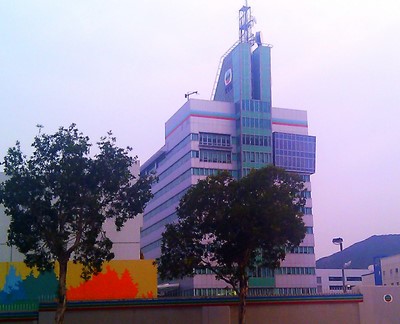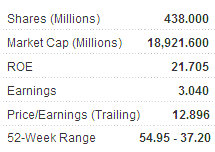
Translated by Andrew Vanburen from: 香港免費電視市場在加热中 (中文翻譯,請看下麵)
TIMES ARE A CHANGIN’ in Hong Kong’s free, public access TV broadcast sector.
But unfortunately for both Hong Kong regulators and consumers alike, the process will likely not be as static-free as originally intended.
The Special Administrative Region’s (SAR) industry for non-pay TV has been dominated for nearly four decades by terrestrial-broadcast owner of TVB Pearl -- Television Broadcasts Ltd (HK: 511) – as well as ATV World, with both giants sharing roughly equal ad revenue and ratings as well.
However, licensing reforms along with competition from ‘new media’ coupled with the economic downturn are resulting in a drama of ‘made for television’ proportions when it comes to trying to shake up the two firms’ market dominance.

The SAR is committed to opening up the free TV market to more competition by increasing licensing issuances and making the process less prohibitive.
This has led to market speculation that listed peers including City Telecom Ltd (HK: 1137), mobile and broadband giant PCCW (HK: 8) and i-CABLE Communications Ltd (HK: 1097) unit Fantastic Television Ltd will soon jump into the fray to vie for their piece of the lucrative pie.
The three aspirants already have some experience in the pay television broadcast sector and can therefore leverage their strengths in existing equipment and network assets to forge ahead with their strategies in the non-pay market.
This will empower the newcomers with the ability to customize their services to specific high-revenue target market demographics, thus saving a considerable sum vis-à-vis the existing giants in terms of broadcast equipment and startup fees.

Insiders will tell you that one of the toughest jobs in TV broadcasting – free or otherwise – is cultivating and then maintaining a core viewership.
Without the ratings and raw numbers, no advertiser would touch unpopular programming with a ten-foot pole, and thus revenue would soon slow to a trickle.
The three firms rumored to be eyeing the free TV market have already invested on average less than two bln hkd apiece in the pay broadcast sector.
City Telecom has been more direct in its plans to throw its hat into the free TV market.
However, the existing free-TV players still hold advantages in hardware, software and human capital in terms of the ability to attract and retain writers, producers, actors and support staff – and even production sets.
Therefore, unless PCCW and i-CABLE step up to the plate with more assertiveness, it is unlikely that Television Broadcasts and ATV World will be relinquishing any of their market share or advertising revenue anytime soon.

And with TVB and ATV currently committed to market investments of over 6.3 bln hkd and 2.3 bln, respectively, within the next six years, as it stands the market does not seem to have a considerable amount of wiggle room for new entrants given the scale of the existing free-TV players’ financial commitments.
In other words, although the market is growing, so are the current market leaders.
On the surface, this may appear to crowd out considerable opportunity for newcomers.
But in fact, with ‘new media’ growing much faster than traditional free television service providers, there is nothing to suggest that the broadcast landscape of tomorrow could forge financially synergistic arrangements between new players and ‘new media’ innovators to provide unforeseen revenue streams for a wider roster of participants.
See also: PCCW: Breaking Up Hard To Do?
香港免費電視市場在加热中
(文: 古你唔到)
香港的免費電視市場,在過往36年,一向由電視廣播(511)為首的無線電視及亞洲電視獨佔。

攝: HKTA
當中又以電視廣播獨大,無論在廣告份額以至收視率,均有支配市場情況。最近香港政府醞釀推出新的免費電視牌照,雖然表面上有助改變支配地位,但是在經濟轉差時,加上數碼電台及免費報紙等新媒體持續增加,短期內要改變電視廣播獨大的局面,恐難上加難。
最近香港政府擬增加免費電視牌照,當中盛傳城市電訊(1137)、電訊盈科(008)及有線寬頻(1097)旗下的奇妙電視,對經營有關牌照感到興趣。前述三間公司本身已經在收費電視市場經營一段日子,因此其在參與免費電視市場時,均不若而同會利用本身現有收費電視的平台及網絡作為發展基礎。因此肯定的是,新的經營者加入時,不會如目前電視廣播及亞視般利用大氣大波接觸廣大觀眾的話,只如該等經營者現有眾多的收費頻道中,加插數個免費頻道。要吸引觀眾,還需要費勁。短期內,觀眾要接觸到新的免費電視頻道,困難重重。
同時按前述三家盛傳有意加入收費電視市場的經營者初步意向,每間初步表示出來的投資額,均少於20億元。除了城市電訊表現積極,承諾開設數十條頻道,並且向現有免費電視台招攬製作人員、演員,甚至興建製作中心之外,其他兩間承辦者,擬開設的頻道只是數條而已。
若相對無線及亞視承諾在2015年共6年時間內,要作出逾63億及23億元的投資計劃,這些準新經營者的投資,明顯不多,亦不成比例。個別公司如城市電訊,平均分配在數十條頻道的投資,更明顯較細。這可以理解成為,後者或以規模效應,將實際投資成本分攤,但是實際效益如何,有待觀察。
此外,現有免費電視經營商電視廣播手持現金29.07億元,相比那些準新經營者的中期業績財政狀況,電訊盈科手持現金多達81.44億元;城電則持有4.76億元;有線寬頻則持有3.69億元。除電盈現金水平及資產較多,其他新經營者相對財政較薄弱,在經營免費電視台時,或需要加強資金運用效率,以至要爭取更多收益,甚至尋求融資,應付未來的投資預算。
在經營策略方面,外間一直聲稱電視廣播因為「慣性收視」,致長期坐大。筆者卻認為,與其這樣說,倒不如說電視廣播的經營及銷售方式,能夠保證長期穩定的高收視點數範圍,甚至轉換成包括網上廣告、轉售節目至收費電視台、拍攝電影,甚至在海外播放節目等不同模式收入,會更為實際。同時這與早年亞視的前身麗的時代不重視經營市務及爭取大眾化廣告的關係,致廣告商長期離棄有關。
例子之一,就是近年五大唱片公司因為在唱片版權與電視廣播談不攏,轉投亞視等,除個別天皇級歌手,其他唱片銷量不前及歌星人氣削弱,亞視的廣告未見明顯增加。隨著廣告客戶更注重效益,特別在經濟轉差時尤甚下,新的免費電視台由原先分眾及小眾經營的平台,取得如電視廣播的廣告效益,如無特別的經營策略,新的免費電視投資,未必有經營成果,很大機會淪為收費台的附送甜點而已。
按過往電視廣播獨大下,才可以在較多資源下,同日應付多組劇集拍攝及綜合節目製作,實現流水作業。發展到最近,個別準免費電視商如城市電訊,高價廣招免費電視台製作人員及演員。這對行業從業員,會在短期內帶來好處,但是長遠新的免費台卻吸走電視廣播的高成本演、藝員及製作人員,若無良好的收益支持,只會帶來燒錢效應。
綜合前述分析,新的免費電視台誕生,無疑為觀眾帶來更多選擇,但是實際效益成疑下,電視廣播的地位,不見得即時會明顯動搖。
請看: 宝峰:中国顶级拖鞋公司,上半年销售激增30%至近6亿元人民币

